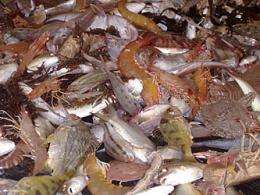Scientists offer new take on selective fishing

(PhysOrg.com) -- A new, less selective approach to commercial fishing is needed to ensure the ongoing productivity of marine ecosystems and to maintain biodiversity, according to a paper in the Proceedings of the National Academy of Sciences of the United States of America.
The paper, ‘Ecosystem-based fisheries management requires a change to the selective fishing philosophy’, was written by a team of authors led by Shijie Zhou of the CSIRO Wealth from Oceans Flagship.
Dr Zhou says ecosystem-based fisheries management (EBFM) is broadly practiced as a means of reducing the impact of fishing on marine ecosystems while ensuring sustainable fisheries.
He says fishing methods under EBFM vary greatly in how selectively they catch fish. The common view is that highly selective methods that catch only one or a few species above a certain size limit are more environmentally responsible.
But recent advances in fishery science and ecology suggest a selective approach may exacerbate rather than reduce the impact of fishing on both fisheries and marine ecosystems.
“Selective fishing alters biodiversity, which in turn changes ecosystem functioning and may affect fisheries production, hindering rather than helping to achieve the goals of EBFM,” Dr Zhou says. “These effects have been overshadowed to some extent by a focus on overharvesting”.
“We believe it is time to critically rethink traditional selective fishing approaches that might not protect ecosystems and fisheries as intended, but may in fact make them more vulnerable to large changes in structure and function.”
Dr Zhou and his co-authors propose a “balanced exploitation” approach combining reduced fishing effort, less selective fishing strategies, and better use of the catch to help achieve sustainable overall yields while maintaining healthy ecosystems.
“The trade-off is lower exploitation levels on currently highly targeted species against better use of more parts of the ecosystem,” Dr Zhou says.
“Fisheries production could actually increase through better use of non-target species, while reducing unsustainably high catches of target species, thereby helping to meet the challenge of increasing global food demand.”
Dr Zhou says the implications of such a change in approach would need to be considered by a wide range of stakeholders including fishermen, fishery managers and conservation agencies.
Provided by CSIRO

















